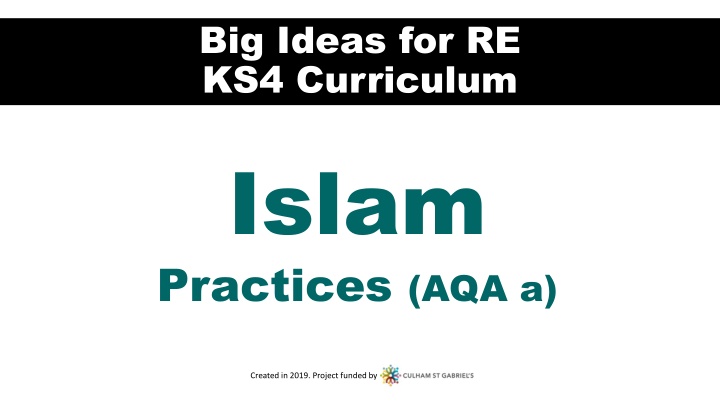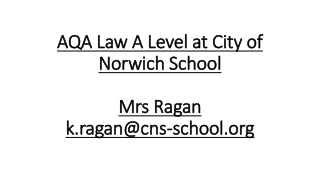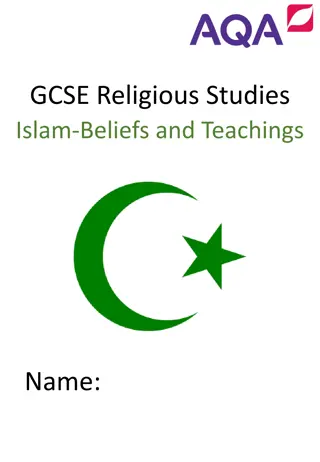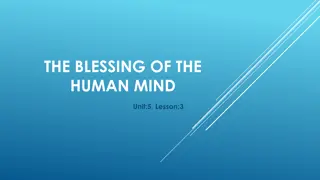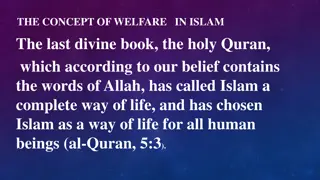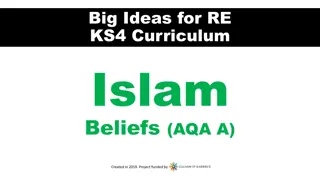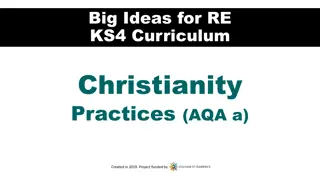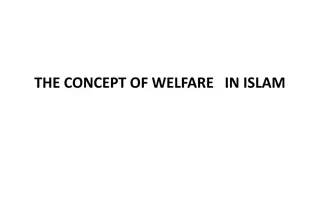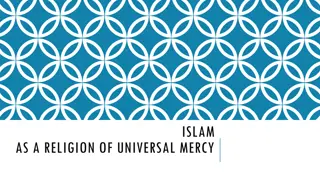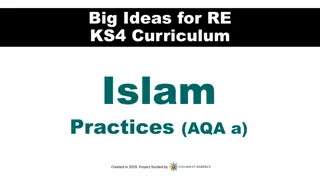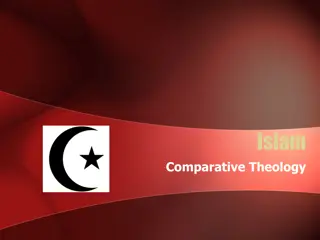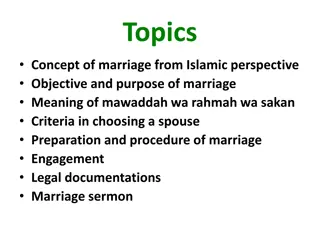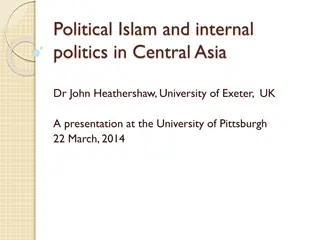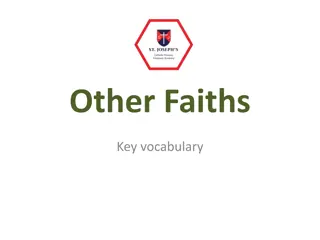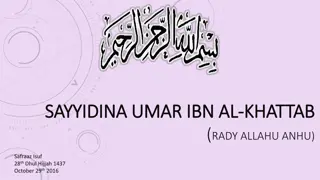Big Ideas for Islam Practices in AQA Curriculum
This project focuses on exploring key concepts in Islamic practices, emphasizing beliefs, diversity, context, ethics, and philosophy. It delves into the worship, duties, festivals, and significance of Islamic practices, providing an in-depth understanding for KS4 students. Detailed discussions on the Five Pillars of Sunni Islam and Ten Obligatory Acts of Shia Islam are included, along with the significance of Salah, Sawm, Zakah, Hajj, and Jihad. Additionally, it examines the historical and theological aspects of the Hajj pilgrimage in the context of modern times.
Download Presentation

Please find below an Image/Link to download the presentation.
The content on the website is provided AS IS for your information and personal use only. It may not be sold, licensed, or shared on other websites without obtaining consent from the author.If you encounter any issues during the download, it is possible that the publisher has removed the file from their server.
You are allowed to download the files provided on this website for personal or commercial use, subject to the condition that they are used lawfully. All files are the property of their respective owners.
The content on the website is provided AS IS for your information and personal use only. It may not be sold, licensed, or shared on other websites without obtaining consent from the author.
E N D
Presentation Transcript
Big Ideas for RE KS4 Curriculum Islam Practices (AQA a) Created in 2019. Project funded by
BELIEFS Religion has beliefs At the heart of each religion is a particular set of beliefs. These beliefs, some of which are shared with other religions, offer a particular vision of the universe, humanity, meaning and truth. Beliefs about the nature of reality underpin religious ritual and expression. DIVERSITY Religion is diverse Within each religion's internal landscape of belief there is variation and sometimes dissent or disagreement. Key religious concepts can be understood in diverse ways. Differences in outlook shape practice and expression. Different groups might be associated with particular times or places. CONTEXT Religious beliefs and practices have a context Every modern religion can be understood as the result of political, social, economic or existential pressures that have occurred throughout its history. Understanding such pressures can enhance understanding of the religion. The development of a religion can be seen through large-scale movements or the influence of figures and groups throughout its history; modern religious forms can be understood as contingent on these pressures and individuals. ETHICS Religion has an ethical dimension Each religion offers ethical principles regarding social, practical and spiritual matters. Some religious ethical principles apply within the logic of the religion only, while others apply to human societies more widely. Religion is one form, but not the only form, of ethical guidance. Aspects of religion can raise ethical questions, such as regarding equality and power. PHILOSOPHY Religion raises philosophical questions Each religion provides answers to questions of ultimate meaning. Religious answers to such questions are part, but not all, of the ways these questions might be answered. Some answers offered from within religion raise further questions, such as regards authority or reliability.
AQA a: ISLAM, PRACTICES AQA a: ISLAM, PRACTICES Worship Five Pillars of Sunni Islam and Ten Obligatory Acts of Shi a Islam. Shahadah: declaration of faith and its place in Muslim practice. Salah and its significance: how and why, including times, directions, ablution (wudu), movements (rak ahs) and recitations; salah in the home and mosque and elsewhere; Friday prayer (Jummah); key differences in Sunni and Shi a salah, different Muslim views about the importance of prayer. Duties and festivals Sawm: role and significance of fasting during Ramadan including origins, duties, benefits of fasting, exceptions and their reasons, the Night of Power, Qur an 96:1 5. Zakah: role and significance including origins, how and why it is given, benefits of receipt, Khums in Shi a Islam. Hajj: role and significance including origins, actions performed at sites including the Ka aba at Makkah, Mina, Arafat, Muzdalifah and their significance. Jihad: different understandings of jihad: meaning and significance of greater and lesser jihad; origins, influence and conditions for the declaration of lesser jihad. Festivals and commemorations, their importance for Muslims in Britain today, including origins and meanings of Id-ul-Adha, Id-ul-Fitr, Ashura.
KS4: AQA A Islam: Practices KEY QUESTION AND CONTENT 1: How Islamic is the Hajj? a) History- Muhammad s family guardians of the Hajj & Ka aba b) Pre-Islamic elements c) Importance in Islam BIG IDEAS LEARNING CONTEXT: historical context of the Hajj PHILOSOPHY: discussion of what makes Hajj Islamic 2: Is Hajj still the same? Info on Muhammad s hajj, Modern hajj CONTEXT: setting modern Hajj in historical context BELIEFS: theology of Hajj 3: Intention or action: what matters? a) concept of intention- the intention to do an action is as good as doing the action b) intention in prayer- intention to pray is essential- denoted by wudu. A prayer when distracted is not a prayer c) Wider ethical debate about intention and action 4: Is Islam something you do or something you believe? a) Shahadah b) Salat (brief recap), sawm- reasons for fasting. 5: Celebration Eid ul Adha (end of Hajj) Eid ul fitr ETHICS: consideration of ethical value of intention and action BELIEFS: beliefs about value of intention in Islam CONTEXT: setting prayer in context of intention BELIEFS: beliefs underpinning salat and sawm CONTEXT: setting Shahadah, salat and sawm against context of belief or action BELIEFS: beliefs and theology underpinning Eid festivities CONTEXT: Eids in the context of Ramadan (Eid ul fitre) and Hajj (Eid ul Adha)
6: Celebration or commemoration? Recap Karbala learning from KS3 Ashura in Shi a Islam Brief comparison to Sunni Ashura observances CONTEXT: Ashura in context of Karbala BELIEFS: identifying Shi a- specific beliefs DIVERSITY: differences n approach to Ashura across S&S 7: is Zakat a membership fee? Info about zakat: compulsory/ obligatory, zakat as purification compare to khums ETHICS: consideration of ethical value of obligatory giving BELIEFS: zakat as purification ETHICS: wealth as something to be purified/ duty to be giving DIVERSITY: zakat compared to khums BELIEFS: theology underpinning 5 pillars and 10 obligatory acts DIVERSITY: differences across S&S 8: do all Muslims do the same thing? Recap 5 Sunni Pillars 10 Obligatory Acts- shi a Islam 9: Greater jhad: how to change the world? Beliefs about greater jihad, modern examples, include Muslim charities BELIEFS: beliefs about greater jihad CONTEXT: principles of greater jihad in today s world ETHICS: is being good a practical or spiritual matter? 10: Debate: would war with Assad of Syria be jihad? Debate as a class. CONTEXT: setting principles of lesser jihad in context of Syria ETHICS: ethical consideration of use of force in a specific situation 11: Revision 12: exam practice
